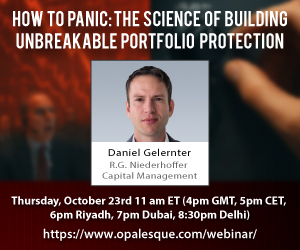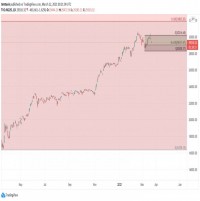|
|
Toby Birch is Managing Director of Oppenheim and Co Limited (investment
management) and Guernsey Gold Limited (bullion dealing). He is a Chartered
Fellow of the Chartered Institute for Securities and Investment and also hold's
the Institute's Islamic Finance Qualification. He is author of The Final Crash,
one of the most prescient predictions of the credit crisis published in May
2007. He was previously CEO at Blackfish Capital Holdings where he managed a
resources-based hedge fund and senior investment manager at Bank Julius Baer in
Guernsey.
Anyone with even a passing interest in Islam will be struck by the common sense
and simplicity of its message. As a non-Muslim this is most striking when
visiting any mosque and witnessing the relative informality of the clerical
structure during prayers. If one delves deeper into its economic lessons then
similar themes appear. It soon becomes apparent that there is profound wisdom
and age-old understanding of human behaviour. Westerners struggle to comprehend
why interest is a problem and shrug it off as a religious idiosyncrasy. However,
there is nothing superstitious about refuting the use of usury. The UK will be
spending more on interest than it does on defence in 2011 while the entire Euro
currency block wavers under the weight of debt; exactly who is being irrational
by urging its avoidance? Some smug commentators lump gold bugs and the
'interest-free crowd' into the same category, implying they are somehow
unsophisticated. As one who is associated with both bullion and Islamic Finance,
I would appear to be firmly wedged in that pigeon hole.
We are now all-too-familiar with the tale of the Emperor's New Clothes,
post-2008. The children's fable reminds us of our reticence to ask simple
questions for fear of sounding stupid. It sometimes takes the na´ve or innocent
to bare the obvious (pun fully intended). Similar demands must be made of the
Islamic Finance industry, especially in its formative years. Recent reports
claim that the asset base of such institutions is set to hit $1.5 trillion in
2012. It is difficult to determine how such forecasts are derived given the wide
variety of data sources for each industry sub-set. The total may well be swelled
by the accumulation of petro-dollars at Islamic banks alongside the issuance of
sukuk (bonds) plus takaful (insurance) business. While the numbers are
impressive and the growth rates likewise, one wonders whether such bank deposits
are actually doing anything useful for the wider economy or simply stagnating
and devaluing with the dilution of the US dollar. Perhaps the real numbers to
look at are those of penetration rates. There are close to 83 million Egyptians,
most of whom are Muslim (estimates range from 80% to 95%), yet Islamic finance
is an after thought. Indonesia is an even more compelling market. Yet few
institutions have a regional strategy, let alone international presence, to
enable distribution.
Given the history of Islam, one would expect its financial system to be a
grass-roots phenomenon. After all, the religion was propagated by word of mouth,
assisted by the example set by Muslim traders, known for their honesty and fair
dealing. However, the modern industryhas a hard, institutional feel to it.
Western investment banks are drawn by the hefty corporate finance fees on big
sukuk bond issues. There is minimal appetite for offering retail financial
services. Small but sincere fund providersstruggle to afford the extra costs of
Islamic compliance. Large institutions argue that if one cannot afford a single
scholar for your fund's fatwa, let alone an entire Sharia Board, then hard luck,
that's the market rate.Their wealth management armshave alsoattempted to milk
money from the wealthy in the Middle East, offering Islamic-looking funds
catering for exotic and esoteric themes. The average fund size is apparently
around $30m so it would appear their uptake has been unspectacular. It is tough
to track both the size and performance of such vehicles as the data is often the
preserve of subscription-only services. The open qualities that spurred the
spread of Islam appear to be lacking in its implementation. Another missing
aspect is the simplicity, especially if one has ploughed through a Prospectus
witha dizzying array of arrows on transactional diagrams. It is reminiscent of
the illustrations for mortgage backed securities that supposedly proved their
high credit ratings.
Institutions can rightly counter that the retail approach has struggled, citing
the example of the Islamic Bank of Britain, requiring on-going funding from its
shareholders. Like all modern businesses, scale is essential to compete with
interest-based banking services. This is why Islamic retail banking requires
more than just a large pool of Muslims to succeed; the customers need to have
money to deposit as well. This allows banks to upsell services which are more
profitable for both the institution and customers alike, and ultimately more
useful for the wider economy. These are in the form of restricted and
unrestricted accounts that allow greater flexibility for risk and reward.
Ultimately this 'equity' approach is the most economically useful activity a
bank can perform. It reduces systemic risk and counters the inflationary effect
of credit creation. There is huge demand for borrowing by SME's (small to medium
sized enterprises) that cannot find finance. Even when secured, credit is
offered at extortionate margins by the interest-based lenders. The tragedy for
western economies is that SME's generate the jobs but are being starved of
financial fuel. For too-big-to-fail banks, the bail-out has been the greatest
coup of the century. A generation of tax payers will have to fund their
liabilities with none of the benefits. Like an implanted cuckoo, our banking
system acts like a sibling but is really a parasite that gorges our food and
throws us out of the nest once they have outgrown us. The government, like the
host parents of the innocent bird, is tricked into feeding the invader until
they are exhausted by its constant demands.
There are also enormous barriers from regulators, mainly in the form of the
Basel Accords that encourage debt rather than equity-based assets by their very
nature. The old Latin maxim of 'who guards the guards' springs to mind when
considering such decrees. The proponents of usury permeate every institution,
designing laws to protect bond holders and receivers of interest over those who
take greater risk in the form of equity. There are also benign barriers to
Islamic banking, even in tolerant countries like Canada whose regulators want
banking availability for all religions, not just Muslims. Perhaps the religious
tag needs to be replaced with an ethical one to widen its appeal and
palatability. After all, the avoidance of usury is not just common sense but is
also a common theme for People of the Book (a term encompassing several other
religions).
One would expect to see leadership in the Middle East where retail banking has
more potential for significant success. However, Malaysia appears to be taking
pole position with greater uptake for Islamic products and services. Just like
any other service, the benefits of Islamic finance needs to be sold to
customers. It cannot depend on duty or devoutness alone, especially when
customers pay a higher price for the privilege. After all, why should
individuals invest according to Sharia values when Muslim countries' Sovereign
Wealth Funds fail to do so? Using these principals for investment and business
transactions is not just the right thing to do but is beneficial for the economy
and investors alike. It avoids the destabilising effect of derivatives and
leverage while enhancing genuine yield generation and sustainability of the
equity approach.
While recognising the need for capital markets one should not overlook the fact
that institutional money is ultimately sourced from mass market deposits,
pensions, insurance and investments. This stable source of capital could provide
some of the liquidity and long-term funds Islamic banks are desperate for. Will
a retail revolution arise in 2011? Probably not, if 2010 is anything to go by.
We will likely endure another year of sponsor-driven conferences with their
euphemisms, tales of growth paradigms and fancy funds. Like their western
counterparts, some Islamic financiers want a speedy return to business as usual,
finding formulae to mimic an interest-basedľ and ultimately self-destructive -
system. Islam is the oldest yet the latest thing whose tenets stand firm as
generations come and go. The lack of consumer empowerment has allowed the
industry to follow fashion, dictating trends from the top;it would be wonderful
for Islamic finance to flourish organically from the bottom-up.
Your feedback and comments are very important to us, please feel free to contact
the author via email.
|





 RSS
RSS










